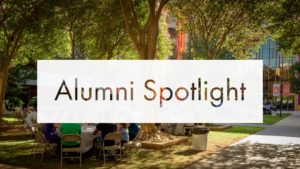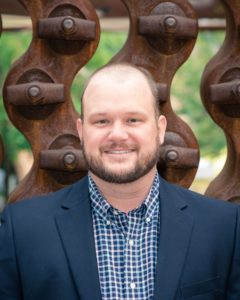Alumni Spotlight: Dr. August Blackburn, owner of Blackburn Statistics, LLC

 Dr. August Blackburn graduated from the Integrated Multidisciplinary Graduate Program (IMGP) at The University of Texas Health Science Center at San Antonio (now called the Integrated Biomedical Sciences program) in 2013. He is now the owner of Blackburn Statistics, LLC.
Dr. August Blackburn graduated from the Integrated Multidisciplinary Graduate Program (IMGP) at The University of Texas Health Science Center at San Antonio (now called the Integrated Biomedical Sciences program) in 2013. He is now the owner of Blackburn Statistics, LLC.
When did you first become interested in science?
If you are interested in the world around you, you are interested in science, even if you don’t know it. I have always been interested in science. I remember running around with a magnifying glass looking at things like plants and bugs as a kid. For my third grade science fair I showed how liquids with different densities would separate and sit in layers on top of each other. So yeah, always.
Why did you pick The University of Texas Health Science Center at San Antonio and your program?
I picked The University of Texas Health Science Center at San Antonio because I knew that there were people doing the science I was interested in. It was also close to where I grew up so I had family and friends nearby.
Tell me more about your career path.
As a kid I wanted to be a scientist and a businessman. Now I am a scientist and a business owner. My graduate mentor was Donna Lehman Ph.D. For my dissertation I studied a type of genetic variation (copy number variation) and its effects on gene expression and risk for disease in the Mexican American population of South Texas. Statistical genetics is a hot and very exciting field. After I graduated, I worked with Harald Göring Ph.D. at Texas Biomedical Research Institute and UT Rio Grande Valley working on phasing whole genome sequencing data and analyzing high throughput metabolomics data. I now own Blackburn Statistics, LLC, a company through which I provide biostatistics and bioinformatics consulting services.
Tell me about your current career, what do you do?
I own Blackburn Statistics, LLC, a company through which I provide biostatistics and bioinformatics consulting services. I work on a variety of different projects from meta-analyses of statin trials to setting up and analyzing clinical trials for a device manufacturer to writing the statistical section of SBIR grant proposals to general advising on the meaning and interpretation of the biomedical literature. The nature of the work varies but the common theme is biostatistics or bioinformatics. As an example of what I work on, I was the principal statistician on a successful application from which Brain Sentinel, Inc. received U.S. Food and Drug (FDA) de novo clearance to begin marketing the SPEAC® system, a Seizure Monitoring and Alerting System.
What is a day like in your job?
Being self-employed gives me a lot of flexibility. I have a two year old and a nine month old. I keep my kids at home during the day. I go to the gym, run errands, and work on things around the house. I take calls and do some light marketing during the day. I do most of my actual work at night while everyone else is asleep. When I am especially busy I get help with watching the kids and I work during the day. Really, independent consulting is a very nice lifestyle. As far as the balance of what I actually do when I’m working, its 10% meetings, 10% marketing, 25% writing, 15% reading, and 40% data analysis. Data analysis is by far my favorite part. I love taking a bunch of messy data and making sense of it. I especially love when the analyses require a component of programming. For me programming is more enjoyable than listening to music or looking at a beautiful painting.
How did the education you get at The University of Texas Health Science Center at San Antonio prepare you?
When you do a Ph.D. you teach yourself most of what you learn and need to know. The Integrated Multidisciplinary Graduate Program (IMGP) at The University of Texas Health Science Center at San Antonio (now called the Integrated Biomedical Sciences program) provided the system and structure that allowed me to do that. My interest in graduate school gravitated toward the computational side of biomedical science and so that is what I spent a lot of my time learning about.
What is the most challenging part of your work?
The entrepreneurial side of what I do is the most challenging. In a way it is as much a process of personal development as a technical exercise.
What is the most rewarding part of your work?
Creating and growing a business is rewarding financially and also personally gratifying. Working in biomedical science is also gratifying because the things that I work on can have a direct impact to improve peoples lives.
What has been your proudest achievement?
I helped bring the Brain Sentinel Inc. SPEAC® system to market, and I am proud of that. However, I can’t take to much credit for that since they developed a great product and I got involved in the FDA submission process later. So, what I am most proud of is transitioning from academia to consulting smoothly. Starting a company and becoming self-employed is financially risky and requires a lot of hard work and smart planning. The transition to self-employment has been smoother than I expected. I had help and support from several people, but I am especially thankful to my wife, Megan Blackburn Ph.D., and my mentor, Harald Göring Ph.D., for their support.
What would you tell a current student interested in your career? Any advice?
Call me. If not me, call other people doing similar consulting work to what you want to do. Talk to them and learn what you can from them. If you are lucky (or smart) they may even send work your direction.
What do you like to do outside of work?
I like to spend quality time with family and friends. I like watching sports when I can and I go to the gym several times a week.
When did you start becoming interested in science?
I have always been interested in science.
Growing up, what did you want to be?
I wanted to be a scientist and a businessman. I also wanted to be a politician, but I didn’t fully appreciate what that meant.
Who has influenced you the most in life?
My wife. Marrying Megan was the best decision of my life.
If you were stranded on a deserted island, what one band or musician would help keep your sanity?
I’d be perfectly content listening to the sounds of nature. I like music but I wouldn’t need it if I were on a deserted island.
What do you consider your favorite hobby?
Fitness. I started taking it seriously this year after many years of being out of shape. I pay close attention to my diet and stay disciplined about how much I eat. I’ve lost 45 pounds since March and I’m in the best shape I have been in in about a decade. My squat and deadlift are both above 400 pounds and my bench is above 300. I’m not going to win any power lifting competitions but I am getting stronger and more fit every week.
What is your favorite quote?
I don’t have one.
If you could have dinner with one person, living or dead, who would it be?
My wife. With a toddler and an infant in the house having a dinner out with my wife sounds pretty great.
If you won the lottery, what would you do?
I don’t know but I’d like to find out.
If you could travel anywhere, where would you go?
Somewhere remote where there is good fishing and the days are lazy. I wouldn’t mind taking another trip to northern Ontario.
If you could only eat one thing for the rest of your life, what would it be?
Pizza.
Which authors or books have influenced you the most?
‘Beginning Perl for Bioinformatics’ by James Tisdall. That book is great. Being able to program is like having a super power. Reading this book is where my journey in bioinformatics really took flight.
Tell us something about yourself that otherwise we wouldn’t know or guess.
I have nine toes. I had meningitis and septicemia as a teenager and had several surgeries including an amputation of my right pinky toe. I came very close to dying. I am thankful for the doctors and nurses that took care of me and the medical science and technology that helped save my life. This experience was part of what drives my interest in biomedical science.
Interested in connecting with August, ask him on gsbsalumni.com.
